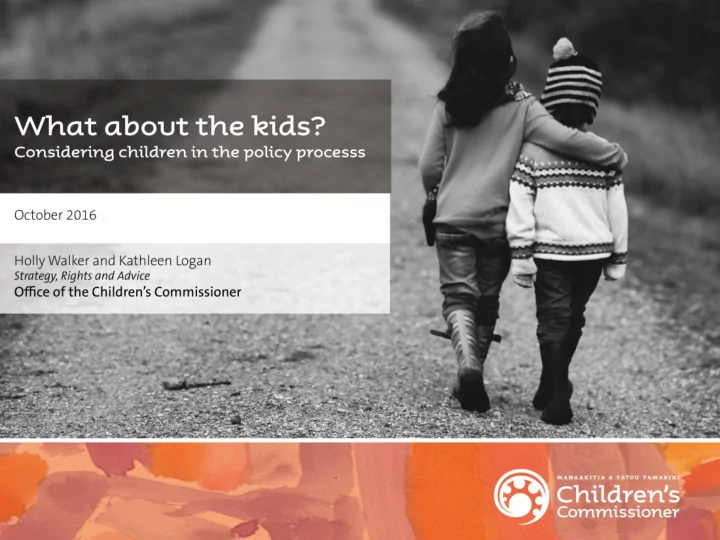

Edit Title – see notes Holly Walker and Kathleen Logan below Strategy, Rights & Advice Office of the Children’s Commissioner What about the kids? Considering impacts on children during legislative review Law Commission August 2016
occ.org.nz/ statsonkids
You should leave today with • A clear definition of child-centred thinking • A grounding in children’s rights • A tool to apply child- centred thinking to your work • Where to go for more information
Young People’s Advisory Panel: advice to Minister of Social Development
Defining child-centred
Some people might have the preconception that being child-centred means doing whatever children say and looks something like this video from Jono and Ben’s ‘Kids Review’ show… https://youtu.be/rlVP-g_0X34?list=PLvM6c4j3Bg-xM_3GjzfmVBC4Zchr9wCRD (official youtube channel)
Being child-centred is Basing decisions and actions on what’s best for children • Recognising that children have rights • Understanding what children need • Asking what children think and listening • Making decisions accordingly
When done well, it can look more like this consultation of children for SKIP (parenting resource) https://youtu.be/2b8IcbII1Ec
“The children of the State have a voice and know the system better than anybody. Please ask us.”
Introduction to children’s rights and needs
UNICEF and Save the Children supported their Youth Ambassadors to ask children what they thought about their rights, and about issues they face. They reported that children can be surprisingly articulate and are experts on their lives and things that affect them. https://youtu.be/RiqRk7wxXh4
Four Principles: Rights of the Child Non-discrimination Best interests Life, survival and development Voice of the child Tell them what to expect CYF reform Special Protection Raising the age education Information Tenancy Violence regulation prevention Housing From Decile Social Bullying cruelty, funding Security prevention Rights abuse, Welfare Healthcare Online safety neglect policy Education and Obesity policy prevention UN Convention on areas the Rights of the Child
A child-centred tool for decision-making processes
Four questions to ask: 1. How will the decision affect children? 2. What are the differential impacts? 3. What do children say? 4. What will you do about it?
Question 1: How will the decision affect children? • Impact of Auckland’s CBD urban planning on children • First considered what children need and what facilities were available – child care, recreation etc. • Then asked children • Expected and unexpected findings – e.g. 60 percent concerned about noise
Question 1: Sense of identity and belonging How will the Stable, Safe, healthy nurturing environment decision family affect children? Supportive Safe, healthy community homes and play Adequate Access to income to health services meet needs Education that develops the child
Question 2: What are the differential impacts?
Question 2: What are the differential impacts? • Younger/older children • Ethnicity • Disability • Gender-identity-diverse • Groups with different characteristics, e.g. with parents in prison, parents with disabilities • How can these impacts be mitigated (or amplified, if one group is targeted to benefit)?
Question 3: What do children say? ‘My World My View’ Ministry of Education consultation on inclusion: https://vimeo.com/169769705
www.occ.org.nz
Methods of Engagement www.occ.org.nz/listening2kids/how-you-engage/ engagement-methods/
Question 4: What will you do? Base your decisions on the information: • Understood effects on children /differential impacts Make conscious decisions in best interests of children: • Amplify positives / Mitigate negatives • Justify negative impacts • Anticipate consequences Demonstrate that you have considered children
You should leave today with • A clear definition of child-centred thinking • A grounding in children’s rights • A tool to apply child-centred thinking to your work • Where to go for more information
More information: www.occ.org.nz / listening2kids Being child-centred , OCC, 2015 www.thehub.superu.govt.nz UN Convention UNICEF NZ h.walker@occ.org.nz k.logan@occ.org.nz
Recommend
More recommend